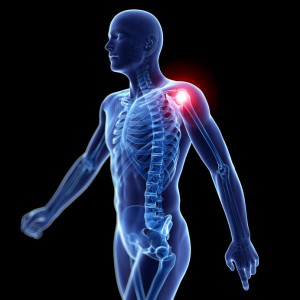Shoulder Problems
 There are a number of conditions that can effect the shoulder joint. The shoulder joint itself sacrifices stability for mobility allowing us to carry out tasks like picking an apple from a tree and eating it. This does not mean the shoulder is a weak spot, however, it’s complexity and large range of movements leaves the shoulder susceptible to multiple conditions that may cause pain.
There are a number of conditions that can effect the shoulder joint. The shoulder joint itself sacrifices stability for mobility allowing us to carry out tasks like picking an apple from a tree and eating it. This does not mean the shoulder is a weak spot, however, it’s complexity and large range of movements leaves the shoulder susceptible to multiple conditions that may cause pain.
What Causes Shoulder Pain?
As the shoulder girdle is complex in it’s mechanism there are multiple conditions that could cause pain. This depends on which part of the shoulder has been affected. Below is a list of different areas that can cause pain effecting the shoulder:
-
Frozen Shoulder
Frozen shoulder refers to changes and restriction occurring in the joint capsule that typically cause the shoulder joint to seize up (freeze). The pattern symptoms associated with frozen shoulder are typically; 3 months of pain and decreasing movement within the joint, 3 months of very limited shoulder movement with no pain, and 3 months of movement gradually returning. These times vary as everyone is different.
-
Tendonopathy’s (tendon problems)
Multiple tendons cross the shoulder joint including; the rotator cuff group and biceps tendon. Irritation or injury to one of these tendons can cause local inflammation at the tendon. The symptoms of a tendonopathy include pain when lifting and pain on certain movements of the arm (anything that may cause re-irritation to the tendon.
-
Arthritis
Through life use of joints causes wear and tear to the articular cartilage eventually leading to degeneration and arthritic changes. Factors causing this to happen earlier than normal include impact to the joint, poor health, and injury. The typical characteristic of arthritic pain include reduced movement, pain and/or stiffness after inactivity, pain in the joint after high impact or loading.
-
Instability or Dislocation
Most people will generally be aware if they previously dislocated their shoulder, however, some people can have an underlying instability in one or both of their shoulders. An unstable shoulder does not necessarily cause pain or symptoms and may never cause problems but may be a reason why problems occur.
-
Trauma
Post injury pain could be a sign of a sprain or fracture, especially of presenting with bruising or swelling and may require medical attention.
-
Mechanical Referred Pain From the Spine
The shoulder receives its nerve supply from the neck and irritation to one of these nerves could cause referral into the shoulder and arm. The pain referral from an irritated spinal joint can cause pain around the shoulder and shoulder blade. Mechanical referred pain is associated with symptoms worsening or being relived by certain movement.
-
Non Mechanical Referred Pain
Unexplained shoulder pain that does not change on movement of the the neck or body could be a sign of pain being referred from elsewhere in your body (eg. chest or abdomen) and requires medical advice.





